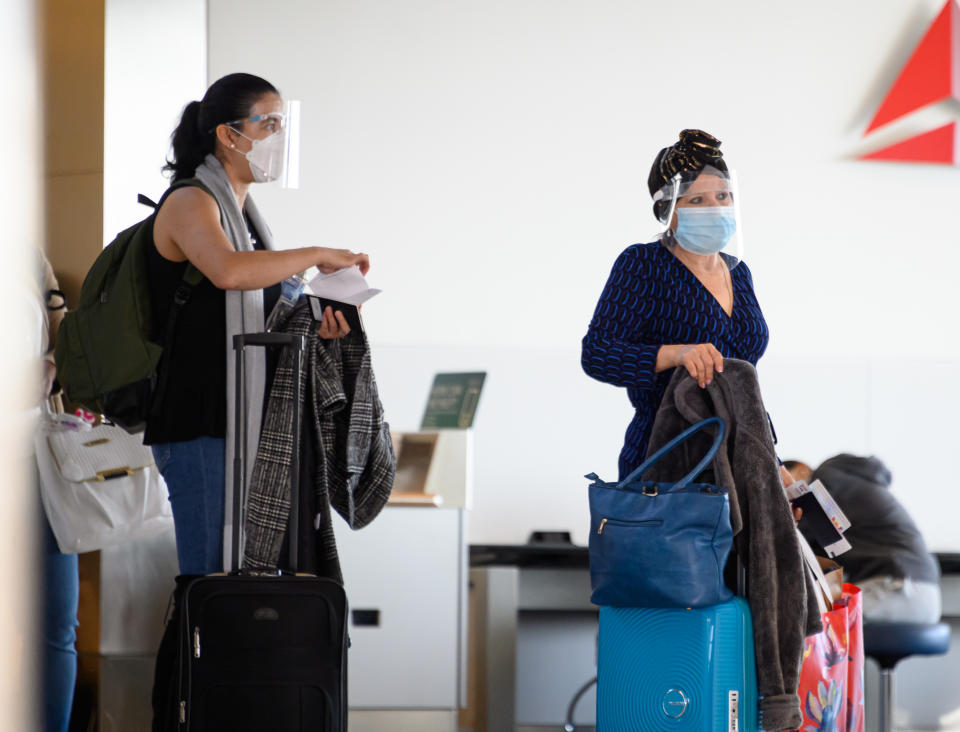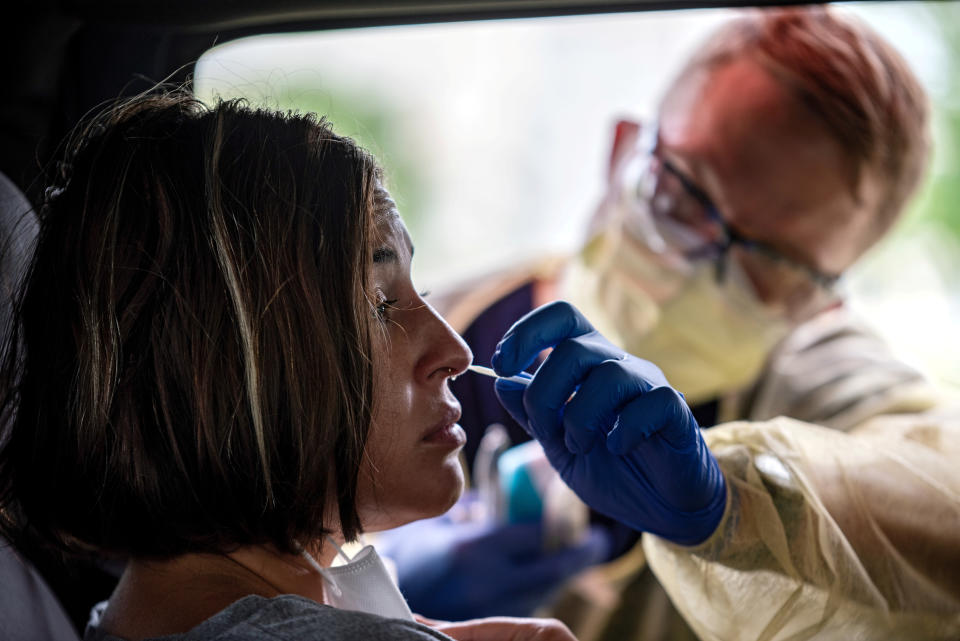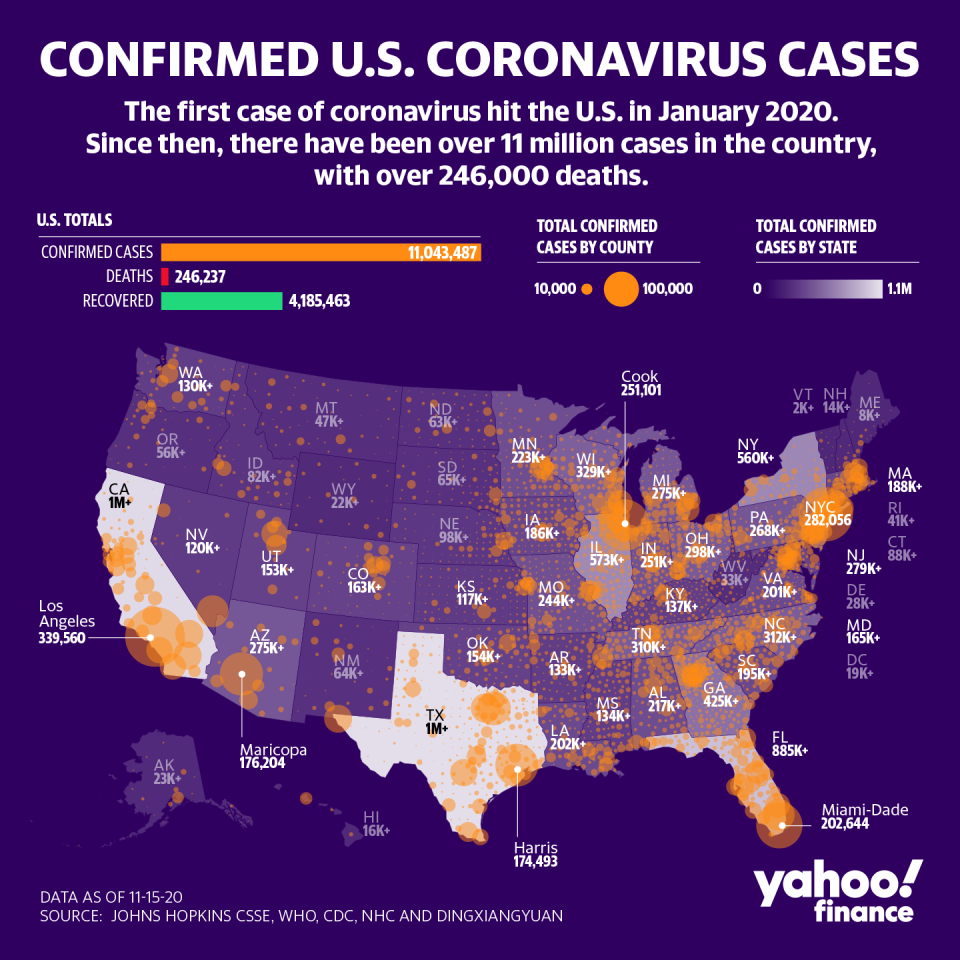Health experts on Thanksgiving travel and gatherings amid coronavirus surge: Don't do it.
Medical experts are begging Americans to quit Thanksgiving cold turkey this year as coronavirus cases surge across the country. Otherwise, they warn, the ramifications could be disastrous.
“We’re in the worst condition we have ever been in this country,” said Dr. Dara Kass, associate professor of emergency medicine at Columbia University Medical Center. “People are not realizing that we are going to continue to have worse numbers, higher hospitalizations, higher deaths, and much more infection between now and Thanksgiving.”
Read more: The money questions many retirees are asking this Thanksgiving
While the Centers for Disease Control and Prevention (CDC) issued supplemental “considerations” for Americans who plan to celebrate Thanksgiving, the guidance runs against best practices recommended by experts who spoke to Yahoo Money.
The CDC’s guidelines give “permission for people to be exceptions to the rule,” so they can carry on with their large-scale Thanksgiving traditions, Dr. Kass said, rather than being a “clear case of rules that people need to follow.”
‘Rules that people will break just a little bit’

The CDC guidelines aren’t realistic, either, Dr. Kass said, such as not allowing pets to interact with those outside the household, ensuring each person stays six feet from other guests, limiting contact with communal surfaces and shared items like serving utensils, and avoiding hugs and handshakes from people from other households. The guidelines also encourage people to avoid singing and shouting.
“Have you been to a Thanksgiving that doesn’t have shouting?” Dr. Kass said.
Read more: Retail CEOs offer up their 4 holiday shopping predictions
Emphasizing that Thanksgiving is just one event, but has “thunderclap consequences for the country,” Dr. Kass said these are “rules that people will break just a little bit.” Even those with the best of intentions will naturally default to laxer measures.
“They'll be four feet apart instead of six feet apart. They'll shout for a while, realize they’re shouting and stop,” she said. “They'll wear masks until they don't.”
‘Hospitals are already close to capacity’
The concerns over Thanksgiving come when COVID-19 cases are spiking across the country, threatening to strain the healthcare system.
“What our biggest fear is and what we are seeing happen now is our hospitals are already close to capacity in general,” said Dr. Shikha Jain, chief operating officer of Impact, an advocacy coalition of Illinois-based healthcare workers. “We don't have the nurses and the doctors and all of the other people who really make our health system run. They are getting sick.”
The U.S. set a new record in daily cases with more than 180,000 reported Friday, pushing the total case count to more than 11 million on Monday. That’s before any Thanksgiving celebrations.
“The real concern is not the percentage of mortality, it's not how deadly the virus is,” Dr. Jain said. “It's the fact that we're at a point where our healthcare system cannot take care of the number of COVID-19 patients, and also take care of the people who come in with heart attacks, pneumonia, the flu, and blood clots.”
‘A false sense of security’
Getting tested before your Thanksgiving gathering isn’t a flawless workaround, especially if plans include traveling great distances by air or train because the threat of exposure can be high. Even if your plans include traveling by personal car and don’t include stopping for gas, travelers are still at risk of passing the virus even if they’re not presenting symptoms.
“Getting a test does not mean that you do not have COVID-19,” Dr. Jain said, who canceled her own Thanksgiving plans and will limit her holiday to just those within her immediate household. “Don't let that lull you into a false sense of security.”

A test can come back positive any time from two to 14 days after exposure, so that means you can get a negative test result, but still develop symptoms any time within a two-week period.
Read more: How to relax and recharge during this new normal
“A week ago, you may have been exposed by the grocery bagger, and the day you got tested — because it's in that two- to 14-day window — your test may come back negative,” she said. “But you were exposed a week ago. There's still another seven days where you could develop COVID-19, and we know that even before people develop symptoms they can spread it to others.”
‘Not perpetuating it further’
Individual priorities should take a backseat for the greater good right now, Dr. Kass said.
“It's not about each dinner, it's about the aggregate of all the dinners,” she said. “You're talking about a single meal that basically the entire country shares at once.”

She offered an example. Let’s say the virus is transmitted to one person in 1% of 10 million Thanksgiving dinners. That results in 100,000 new cases, Dr. Kass said. If that person transmits to another person, then that’s 200,000 new cases — all because of one meal.
Read more: Coronavirus: How to take care of your car during a pandemic
Americans should consider Canadian Thanksgiving as a cautionary tale. Two weeks after Canadians gathered for their Thanksgiving celebration last month, there was an appreciable spike in COVID-19 cases across the country, which has a greater land mass than the U.S. but a population roughly equivalent to California.
By enjoying a Thanksgiving dinner with your nuclear family, meaning those you share a primary residence with, the risk of contagion holds steady.
“Having our kids be in school, it should be a priority; keeping our hospitals functional should be a priority; getting our economy back should be a priority,” Dr. Kass said. “Turkey and stuffing is just not it.”
Stephanie is a reporter for Yahoo Money and Cashay, a new personal finance website. Follow her on Twitter @SJAsymkos.
Americans lost $5.4 billion in stolen packages this year, survey finds
Whole Foods offers 'insurance' for burned, overcooked, or botched turkeys on Thanksgiving
Airlines offer flights to nowhere, grounded in-plane dining to bring in revenue
225,000 couples owe a collective $3.7 billion for weddings that didn't happen in 2020
Checking account fees hit record highs this year, study finds
Follow Yahoo Finance on Twitter, Facebook, Instagram, Flipboard, SmartNews, LinkedIn, YouTube, and reddit.

 money
money 

